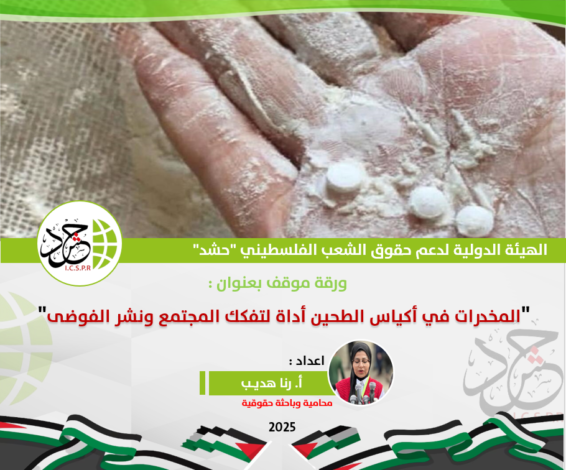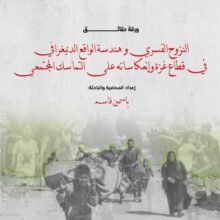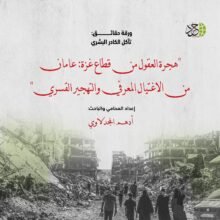
ICSPR Issues Position Paper Titled “Drugs in Flour Bags: A Tool for Disrupting Palestinian Society”
Date: July 28, 2025
Press Release
ICSPR Issues Position Paper Titled “Drugs in Flour Bags: A Tool for Disrupting Palestinian Society”
The International Commission to Support Palestinian Rights (ICSPR) has issued a detailed position paper titled “Drugs in Flour Bags: A Tool for Disrupting Palestinian Society and Spreading Chaos,” prepared by lawyer Rana Hdeib, Director of the Research and Policy Department at ICSPR. This paper analyzes the dire situation facing the Gaza Strip since the start of the Israeli aggression on October 7, 2023. The paper addresses a grave issue involving the discovery of narcotics within flour shipments intended as humanitarian aid through an American organization. This incident reveals the exploitation of the war to destabilize Palestinian society from within and signals severe social and psychological consequences that could threaten community security and exacerbate the suffering of the Palestinian people amid the dire humanitarian crisis in the region.
Investigations Reveal the Use of Narcotics in Humanitarian Aid
According to the paper, a large quantity of “Captagon” was discovered inside flour bags that had been supplied by an American organization involved in the humanitarian supply chain to Gaza. The discovery in July 2025 involved small packages of Captagon hidden carefully within the flour bags, raising many questions about the true intent behind this smuggling operation and the parties involved.
Captagon: A Destructive Drug Targeting Palestinian Youth
Captagon is a powerful drug that severely impacts the nervous system, causing aggressive behavior and leading to serious health effects including hallucinations, depression, nervous breakdowns, and rapid addiction. While this drug is often used for military purposes in some repressive regimes, its smuggling into humanitarian food aid intended for a besieged and suffering population is a blatant violation of humanitarian law. The use of this drug serves as a deliberate tool to disrupt Palestinian society, particularly targeting the youth, who are the backbone and hope for the future of Palestine.
Restriction of Humanitarian Aid and Increased Political Interference
The paper also highlights the systematic siege imposed by Israel on Gaza since the onset of the war, which severely restricted access to humanitarian aid. This policy resulted in obstructing the delivery of essential supplies like food, medicine, and water, placing immense pressure on the civilian population. At the same time, this restriction paved the way for alternative institutions, including the American organization, to be promoted as the primary provider of food aid, despite the lack of effective oversight. This raised suspicions about the role of these institutions in facilitating the smuggling of illicit materials within humanitarian shipments.
Social and Political Analysis of the Incident
The discovery of narcotics in these food shipments occurs within a highly complex political and social context, reflecting organized attempts to disrupt the social fabric of Palestinian society. Throughout the course of the aggression, the Israeli occupation has sought to destroy Gaza’s infrastructure, turning humanitarian aid into an essential lifeline for Palestinians. In this context, humanitarian aid has been exploited not only as a means to alleviate suffering but also as a tool for political and social interference aimed at creating chaos within Palestinian society.
Legal Implications of This Incident
At the international level, this incident constitutes a gross violation of humanitarian laws, including the Fourth Geneva Convention, which mandates that an occupying power ensure the provision of food and medical supplies to the civilian population. Additionally, this event violates the United Nations Convention Against Illicit Trafficking of Narcotic Drugs and Psychotropic Substances (1988), which criminalizes the smuggling of narcotics through civil and humanitarian channels.
At the Palestinian level, ICSPR references the Palestinian Penal Code No. 16 of 1960 and the Narcotics and Psychotropic Substances Law No. 7 of 2003, both of which prescribe life imprisonment or the death penalty for smuggling drugs in emergencies or crises.
ICSPR’s Recommendations for Addressing These Challenges
In conclusion, ICSPR has provided several key recommendations for addressing this serious phenomenon:
Security and Judicial Authorities:
-
Enhance preparedness and monitoring at the crossings and during unloading and distribution operations.
-
Conduct a thorough investigation into the incident and pursue accountability for those involved, both locally and internationally.
-
Employ advanced detection tools to identify smuggling of narcotics within aid shipments.
On the Palestinian Front:
-
Launch awareness campaigns about the targeting of youth with these substances.
-
Support local initiatives that track and document such incidents.
The International Community and Donor Organizations:
-
Discontinue the operations of the American organization and ensure safe, non-politicized humanitarian aid.
-
Review protocols for delivering aid to Gaza.
-
Implement independent oversight of the supply, transport, and distribution stages.
-
Provide safe and separate inspection mechanisms within the Gaza Strip.
-
Urge the international community to take responsibility for the Palestinian people, particularly in stopping unconventional forms of targeting that affect psychological and social health.
In Conclusion
Amid the ongoing tragic conditions in Gaza, ICSPR warns against the continued use of humanitarian aid as a tool to fragment society and increase psychological suffering, which could harm Palestinian society in the long term.





